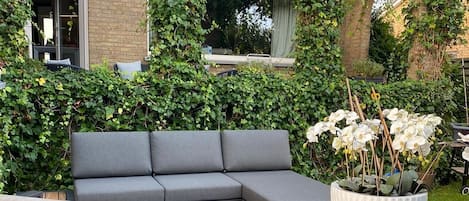Summary:
Welcome to our beautiful villa in Bruges!
- Two spacious rooms with kingsize beds and en-suite private bathrooms.
- Nestled in a quiet, green environment near the city center.
- Enjoy a lovely terrace filled with flowers.
- Easy access by car, bike, bus, or foot; free bike rentals available.
- Perfect for discovering Bruges, known as the "Venice of the North."
- Nearby attractions include historic canals and charming streets.
The Space:
Welcome to our beautiful, cosy, and spacious villa, where we offer two stunning guest rooms featuring king-size beds, private bathrooms, and exclusive toilets. Each room is designed for comfort and relaxation, providing you with the tranquil retreat you need after a day exploring Bruges, also known as the "Venice of the North." Nestled in a green and peaceful environment, our villa is not just a place to stay, but an experience to enjoy.
Located near the center of Bruges, our villa is easily accessible by car, bike, or on foot, making it the perfect base for your adventures. We have four bikes available for you to use free of charge, allowing you to explore the charming canals and cobbled streets with ease. Enjoy our lovely terrace bursting with flowers, where you can unwind in the quiet surroundings. Whether it’s a morning coffee or an evening drink, the terrace is a lovely spot to soak in the atmosphere of this enchanting city.
Comfortable Accommodation:
- Two spacious guest rooms available, each equipped with a king-size bed.
- Each room has a private bathroom with a large walk-in shower, ensuring your comfort and privacy.
- Exclusive toilet facilities provided just for guests.
Ideal Location:
- Our villa is conveniently located just a short distance from Bruges' city center.
- Accessible by car, bike, bus, or foot to suit your travel preferences.
- Surrounded by a quiet and picturesque environment, perfect for relaxation and rejuvenation.
Explore with Ease:
- Four complimentary bikes available for your use to navigate the wonderful sights of Bruges.
- Ideal for leisurely rides through lush parks and along scenic canals.
- Let us share our insider tips for the best restaurants and hidden gems in this enchanting city.
Charming Outdoor Space:
- Enjoy a tranquil terrace filled with beautiful flowers, an ideal spot for quiet contemplation or socializing.
- The outdoor space allows you to connect with nature’s beauty while being close to the city’s highlights.
During your stay, take advantage of the opportunity to explore the rich history and culture of Bruges. The city is known for its stunning medieval architecture, charming canals, and artistic heritage. The Belfry of Bruges and the Markt square are must-visit landmarks, showcasing the city's vibrant history.
Visit the exciting 'Bruges Beer Festival':
This year's Bruges Beer Festival takes place from 02-03-2024, at the intriguing location of the Beursschouwburg. Immerse yourself in the local craft beer scene as you sample various brews from breweries all over Belgium.
With so much to see and do in Bruges, we invite you to stay with us, where comfort, convenience, and enchanting experiences await. We look forward to hosting you and sharing the secrets of this beautiful city!
Other Things to Note:
The owner of this property has partnered with HUSWELL to provide you with a seamless and enjoyable guest experience. While HUSWELL manages the digital rental process, your booking is directly with the owner. Local support, such as cleaning, maintenance, and on-site assistance, is handled by either the owner themselves or a trusted third party appointed by the owner. To ensure the safety and authenticity of both our guests and property owners, we require verification of your reservation through a simple digital pre-check-in process — similar to what you'd experience at a hotel or flight check-in. This process includes basic questions, a rental agreement and acknowledging the house rules, granting you secure and hassle-free access to the property.
Interaction with Guests:
At HUSWELL, we’re committed to providing you with exceptional support throughout your stay. As the facilitator of the digital rental process, our dedicated team is available 24/7 through multiple channels. Our primary method of communication is the booking platform's messaging system, but you can also reach us via HUSWELL’s email, chat, and phone channels. We strive to respond promptly — typically within 10 minutes during business hours and within 60 minutes outside of them. No matter the time or need, we’re here to ensure your stay is as smooth, secure, and stress-free as possible.






